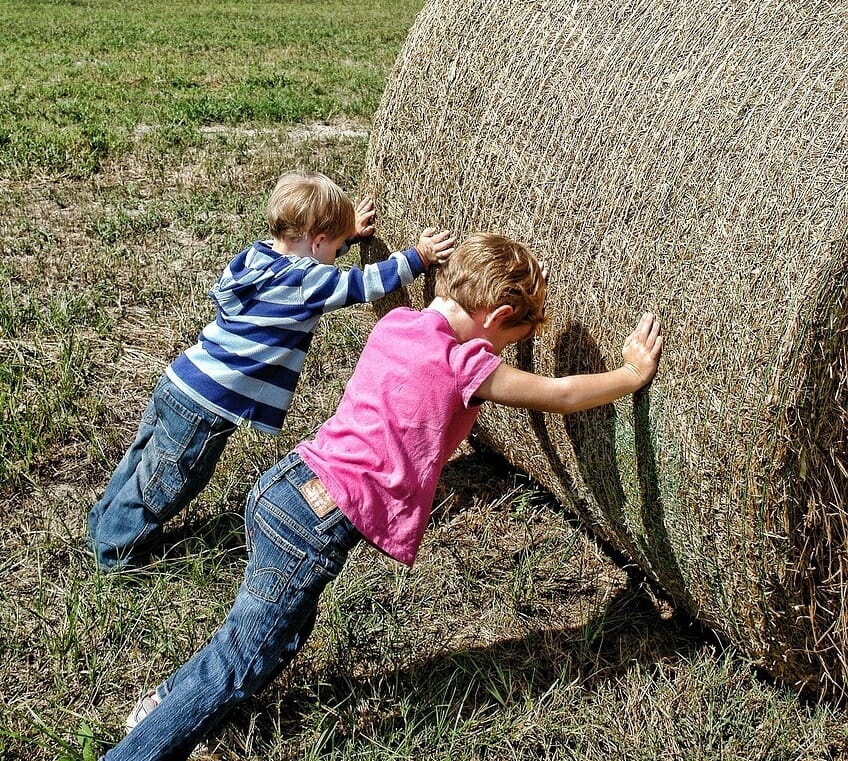Believe it or not, children as young as two years old can begin contributing to work around the house and homestead, and there are a lot of good reasons to get started this early.
Giving children tasks inside and outside the home will support their learning and development and give them practical skills. As they contribute, they will gain confidence in their abilities and be willing to take on more responsibility. They will learn how to solve problems and become more grateful for the work that goes into keeping them safe, comfortable, and fed. Moreover, it’s easy to find ways for them to help.
1. Make A Game Of It
Mary Poppins would agree. Anything can be made easier if it is made fun. If you challenge your child to sort, tidy, or clean an area according to a particular set of rules, you can make it seem like play. There’s no need to go over the top on this; kids have a natural sense of duty and also an inherent tendency to make play out of work. You can easily use these God-given characteristics to teach kids a good work ethic.
2. Be Patient
At first, the chores will take a little longer as you teach the steps to your young child. Bear in mind that kids have to learn what adults have internalized; for example, it might make more sense to a young kid to eat berries as they pick them, rather than put them in the bucket. Try to think like a kid as you explain the chore: get down on their level, break the task into small steps, and remember to look for the fun in it.
Heirloom Audio: Christian Heroes For Christian Kids
3. Work At Kid-Level
One trick to help kids do more chores indoors and outdoors is to have a special, kid-friendly set-up for the chores they are expected to accomplish. If your two-year-old is sorting laundry for the wash, it might help to have a white basket and a dark basket, for example. Storing the supplies at kid level, or having stools to help kids reach, will ensure they will be willing to do more chores.
4. Give Lots Of Positive Feedback
Adults know they are supposed to help out, but kids are still learning. Don’t be afraid to cheer and carry on when your child successfully completes a task on their own, especially the first time. As kids get older, give them more responsibility and tell them how what they are doing is contributing to the livelihood of the family. Make your children responsible for a portion of the homestead, piece by piece. This sense of accountability should readily serve as an essential tool to teach kids a good work ethic. Consequently, they will take ownership of their part and their pride in their work will grow.

Make your children responsible for a portion of the homestead, piece by piece. Consequently, they will take ownership of it.
5. Expect Mistakes
As they learn, your children will break things, spill things, forget to finish tasks, leave supplies lying around, and worse. This is part of learning. If you are choosing chores that your child can accomplish, the damage won’t be too bad (what’s a broken egg from time to time?). Talk to them about what they can do to avoid the mistake next time. Also, see if you can help make the task work better for them and offer reassurance. Never lose your temper – or that may be the end of that chore for a good, long time.
6. Keep Kids Safe
As with all things, teach young children how to do the task correctly and safely. Consider which hazards your child will be exposed to in the environment where they are working, and either move dangerous items out of reach or supervise your child to minimize the risk. Don’t expose them to unnecessary risk when you try to teach kids a good work ethic. Instead, let them see you working safely and taking precautions so that when their turn comes, they won’t eschew safety equipment or measures. Furthermore, children under five should be supervised at all times, especially around water, vehicles, and farming equipment.
7. Be Realistic
First and foremost, don’t expect your child to accomplish a task that is too difficult for their developmental level. Below you can find a chart recommending the type of chores appropriate for young children. Your child and the needs of your homestead may be different, but this will give you a jump start. Before you know it, your child will be contributing to the household and the community regularly and with enthusiasm. This will be because you have been teaching the necessary skills all along.
Starter Chores To Teach Kids A Good Work Ethic
| Very Young Children (Ages 2 – 5) | Young Children (Ages 5 – 7) |
Always under supervision, they can:
| Everything in the earlier list and:
|
You may also consider reading another Live The Adventure Letter article: Add Gardening To Your Homeschool
How do you get kids involved in work? Share your tips in the comments below.
 The Live The Adventure Letter
The Live The Adventure Letter 

